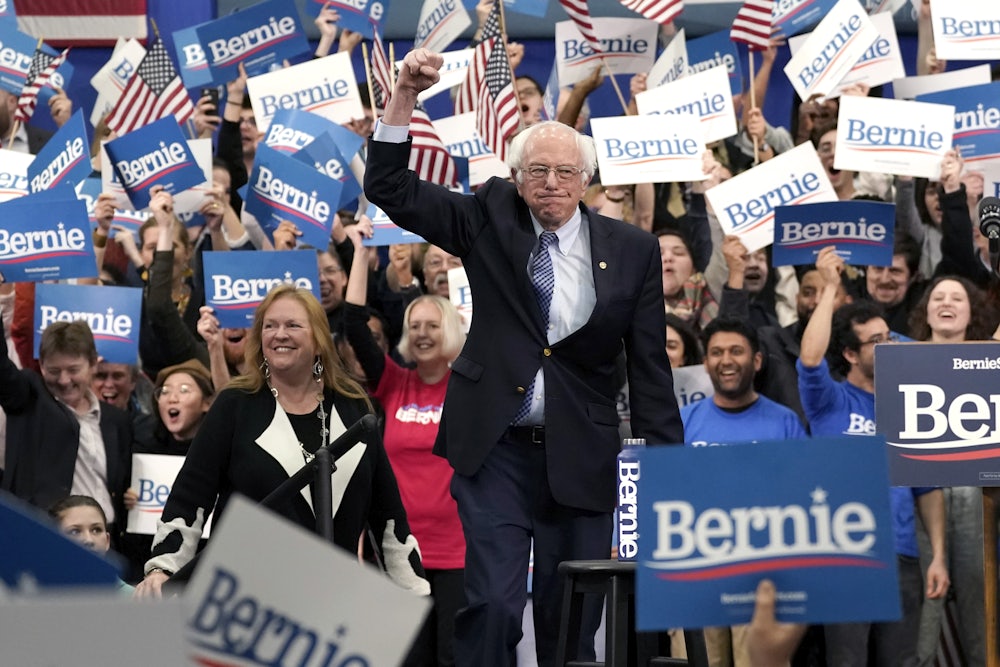The Bernie Sanders campaign has regularly complained about the “liberal” media, particularly MSNBC, the country’s leftmost cable news outlet. Faiz Shakir, Sanders’s campaign manager, told Vanity Fair last month that the network’s anchors and guests are “constantly undermining the Bernie Sanders campaign” by fearmongering about his policies and comparing his movement to, among other things, the rise of Nazi Germany. Even Fox News was “more fair,” according to Shakir. “Fox is often yelling about Bernie Sanders’s socialism, but they’re still giving our campaign the opportunity to make our case in a fair manner, unlike MSNBC.”
Over the course of two presidential campaigns, Sanders has found a measure of success bypassing traditional outlets, particularly cable news. In 2020, he built a campaign that resembles a digital media company, with its own podcast and television show and newsletters that highlight Sanders’s policies (and negative coverage of his opponents). But Sanders’s post–Super Tuesday slide has also underscored the limitations of this approach, the need for more media allies, and the persistent influence of cable news. There are many explanations for Sanders’s lack of support among older people; cable news, which is disproportionately watched by the elderly, is one of them.
A number of news outlets are seeking to fill the sizable gap to MSNBC’s left. Though they’re emerging too late to aid Sanders’s presidential run, they are jockeying to become a go-to news source for his movement. And while these emerging outlets and shows may not yet present a serious ratings challenge to the old guard, they may end up pushing mainstream networks to the left.
Vice is the largest and most interesting new entrant. The media company is rebranding yet again, after experiments in prestige nightly news partnerships, comedy, and more traditional late-night fare. As The New York Times’s Ben Smith reported earlier this week, “Vice’s research, from the expensive strategy firm Magid, found what populists everywhere are discovering: Angry outsiderism is a growth industry.” Vice’s television chief, Morgan Hertzen, told Smith the network’s new mantra is: “The everything system is broken—let’s fix it together.” Its first big acquisition is Anand Giridharadas, the author of Winners Take All, who has become a star as a rare populist voice on MSNBC, particularly Morning Joe.
“When you get to that level of television, everyone is prosperous at the table,” Giridharadas told Smith. “I’m not sure I’ve ever sat next to an uninsured person on television. I sit next to uninsured people on the subway all the time.”
Vice’s goal is to create a network around which the populist left can coalesce. At the moment, the lefty television landscape is small and fragmented. Some shows, like Sam Seder’s Majority Report and The Young Turks, have seen a rise in popularity in recent years (though the latter is currently embroiled in a union-busting controversy, with creator and host Cenk Uygur claiming the company is in a precarious financial position).
Krystal Ball, the host of The Hill TV’s Rising—a Crossfire-ish YouTube show that pits Ball against Saagar Enjeti, a conservative populist—attributed the show’s success (it has 3.5 million viewing hours in the past 25 days) to its willingness to say things that the networks won’t. People like the show, she said, because “rather than smearing or dismissing these mass populist movements, there’s an attempt to understand why people are voting the way they’re voting.”
Means TV—founded by Naomi Burton and Nick Hayes, the Detroit-based filmmakers who made Alexandria Ocasio-Cortez’s viral “The Courage to Change” ad—has quickly found an audience since launching last month. “There’s so much energy that goes into these campaigns that often don’t end up succeeding,” Hayes told me. “We wanted to create something that lasted longer than a single election.”
Though Means TV has a weekly news show, it is not a news network in any traditional sense and features content from filmmakers across the world. “A lot of the stuff we have is entertainment,” Burton said. “We felt like you really don’t want to watch news for 24 hours a day. We have to have a release that still reinforces our worldview and the reality we live in.”
Like the leftist podcasts that emerged during the last election, these shows want to become hubs for Sanders’s supporters and others on the left. Whether they can actually compete with cable news is another question. Means TV has no ambition to do so; instead it is trying to create new content for younger cord-cutters who are unlikely to have cable, let alone watch cable news. But Vice does want to compete with MSNBC, and shifting cable news’s coverage of the left will require pressure from Vice and other emerging networks and platforms.
A major problem with MSNBC’s coverage is the lack of genuine ideological diversity on many of its shows. The network likes to think that Joe Scarborough and James Carville represent the totality of the American political spectrum, but there are actually fewer Sanders-style leftists on the network than his popularity would warrant. Shows like Rising or Vice’s new programming could increase pressure on MSNBC and other cable networks to take the left more seriously. “You have to do everything you can, even if it’s not taken seriously, to get heard by the mainstream,” Ball told me.
